Engender blog
3 Steps to Achieving Primary Prevention in Public Transport
We’ve launched our new series of mini-briefings shining a spotlight on how to achieve a primary prevention approach in different areas of public policy with this new briefing highlighting why safe and accessible public transport is key to gender equality and preventing violence against women.
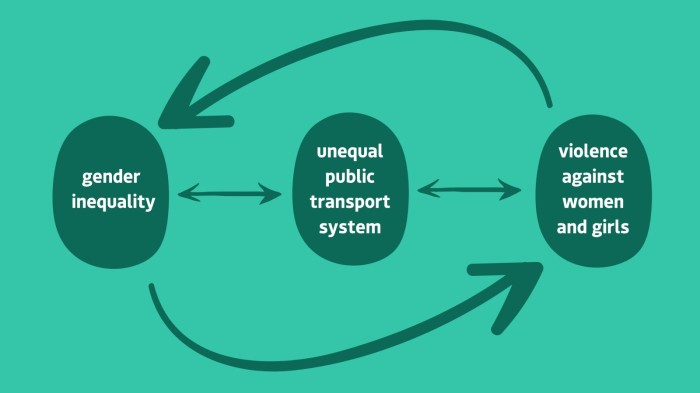
Public transport isn’t just a matter of convenience; for many women, it’s a lifeline that opens doors to education, employment, and essential services, all of which impact gender equality.
However, Scotland’s public transport system fails to serve women’s distinct travel needs, limiting their access to these opportunities and reinforcing gender inequality. Without changes, these limitations keep women from fully participating in society, impacting everything from their financial independence to safety and personal well-being.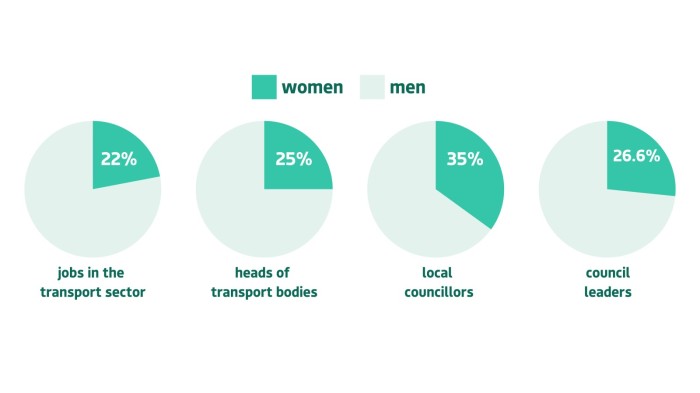
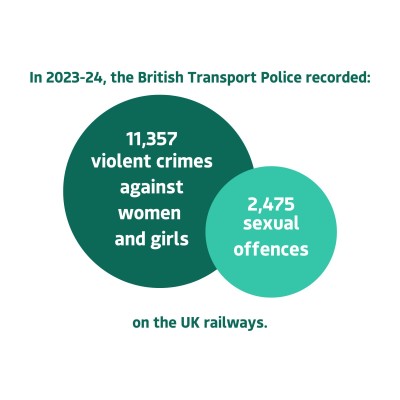 When we talk about primary prevention of VAWG, we’re talking about preventing this violence from happening in the first place. Evidence shows the best way to do this is to tackle the root cause of this violence: gender inequality. Therefore, creating a safe, sustainable and accessible public transport system for everyone is essential for advancing women’s equality and preventing VAWG once and for all.
When we talk about primary prevention of VAWG, we’re talking about preventing this violence from happening in the first place. Evidence shows the best way to do this is to tackle the root cause of this violence: gender inequality. Therefore, creating a safe, sustainable and accessible public transport system for everyone is essential for advancing women’s equality and preventing VAWG once and for all.
Without safe and accessible transport options, women’s access to critical economic and social opportunities is limited, reinforcing gender inequality, which ultimately enables VAWG. Women’s safety on public transport remains a significant concern and barrier to women’s mobility, due to things like lack of regular and reliable services, design of vehicles and transit points, and insufficient staffing levels.
Our new briefing highlights Three Steps Towards Achieving a Primary Prevention Approach in transport Policy
1. Women are equally and fairly represented in policy-making roles
- Improve pathways for women, particularly minoritised women, into the transport sector and career progression opportunities
- Ensure inclusive working environments in the transport sector by implementing flexible working procedures, anti-discrimination and harassment policies and women’s leadership initiatives
2. Policymakers consistently apply intersectional gender analysis in their work
- Collect intersectional gender-sensitive sex-disaggregated data on women’s travel patterns, safety and satisfaction
- Conduct Equality Impact Assessments at the outset of transport policy development to ensure this informs policy and planning decisions at all stages
3. Policymakers mainstream primary prevention in all areas of their work
- Increase opportunities for co-designing transport strategies with women, especially those with lived experience of VAWG on public transport
- Embed women’s safety considerations into transport planning, including in decisions on service provision, the design of infrastructure and staffing levels
Find out more in our new briefing here and follow us on social media to get the latest news on other briefings in the series on housing and planning, coming soon!
GUEST POST: Reflections of the Student Placement Experience - An Insight into the Women’s Sector in Scotland
Today we're publishing the next in a series of blogs from recent student placements Engender has hosted from the MSc in Social Research at the University of Edinburgh and the University of Strathclyde Applied Gender Studies and Research Methods course.
In this post, Beth reflects on her experience of undertaking a research placement and the importance of considering urban planning policies through a feminist lens.
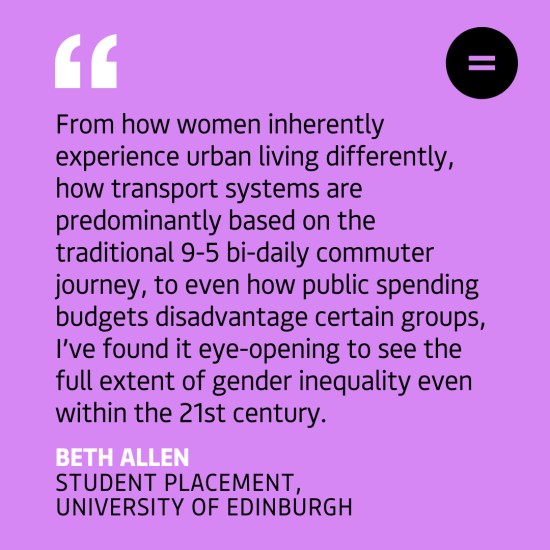
During the summer semester of my MSc in Social Research at the University of Edinburgh, I have been fortunate enough to experience completing my dissertation as a placement student with Engender. This placement has been invaluable, and I wanted to take this opportunity to reflect on this and maybe inspire others to gain experience of working within the women’s sector.
GUEST POST: 'Text me when you're home!'
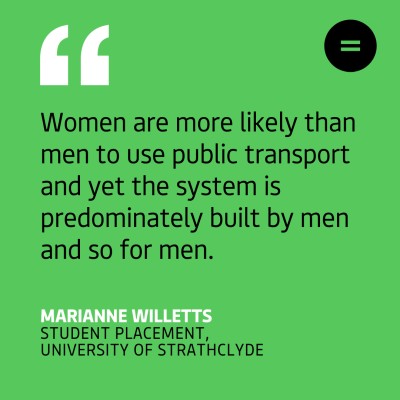
Today we're publishing the first in a series of blogs from the Spring student placements Engender hosted from the University of Strathclyde Applied Gender Studies and Research Methods course.
In this post, Marianne looks at how gender inequality and violence against women affect how women experience public spaces and public transport, and how and when these issues are recognised in the Scottish Parliament.
Keys between knuckles, hair down, earphones out. A routine all too familiar to a woman travelling home after sunset alone.
A male friend once told me that him and his flatmates had a ‘72-hour rule’; if one of them didn’t come home without telling the others where they were, they would wait 72 hours before ‘overthinking’ it and calling the police. I can’t speak for all women, but personally, if it was my female flatmate or friend, it would be at most 12 hours before the panic would set in and a further 12 before I would call the police. Women do not have the luxury of not taking precautions when commuting late at night. Travelling from A to B is necessary in many circumstances, and safety when doing so should be a given, but it is not.
On the Engender: Gender Matters in Public Transport
-400.png)
This month's episode of On the Engender, Scotland's feminist policy podcast, our host Alys Mumford is joined by some excellent feminist voices to take a deep dive into why gender matters in public transport.
Here she writes on her passion for public transport and why it's so important, even if it's not always the first gendered issue to come to mind:
Whenever my sister in law visits me, she brings a copy of 'the Buzzer', Vancouver's public transport pamphlet. When the Borders' Railway reopened, a friend and I made use of it on the first weekend it was running. When I travelled to Dublin to campaign for #Repealthe8th, I chose a 10 hour bus and boat journey over flying. And I still proudly carry my platinum ticket from the first day of the Edinburgh trams. So it's probably fair to say that I fall fairly firmly into the category of public transport geek.
Downloads
 Engender Briefing: Pension Credit Entitlement Changes
From 15 May 2019, new changes will be introduced which will require couples where one partner has reached state pension age and one has not (‘mixed age couples’) to claim universal credit (UC) instead of Pension Credit.
Engender Briefing: Pension Credit Entitlement Changes
From 15 May 2019, new changes will be introduced which will require couples where one partner has reached state pension age and one has not (‘mixed age couples’) to claim universal credit (UC) instead of Pension Credit.
 Engender Parliamentary Briefing: Condemnation of Misogyny, Racism, Harassment and Sexism
Engender welcomes this Scottish Parliament Debate on Condemnation of Misogyny, Racism, Harassment and Sexism and the opportunity to raise awareness of the ways in which women in Scotland’s inequality contributes to gender-based violence.
Engender Parliamentary Briefing: Condemnation of Misogyny, Racism, Harassment and Sexism
Engender welcomes this Scottish Parliament Debate on Condemnation of Misogyny, Racism, Harassment and Sexism and the opportunity to raise awareness of the ways in which women in Scotland’s inequality contributes to gender-based violence.
 Gender Matters in Social Security: Individual Payments of Universal Credit
A paper calling on the Scottish Government to automatically split payments of Universal Credit between couples, once this power is devolved to the Scottish Parliament.
Gender Matters in Social Security: Individual Payments of Universal Credit
A paper calling on the Scottish Government to automatically split payments of Universal Credit between couples, once this power is devolved to the Scottish Parliament.
 Gender Matters Manifesto: Twenty for 2016
This manifesto sets out measures that, with political will, can be taken over the next parliamentary term in pursuit of these goals.
Gender Matters Manifesto: Twenty for 2016
This manifesto sets out measures that, with political will, can be taken over the next parliamentary term in pursuit of these goals.
 Scottish NGO Briefing for UN Special Rapporteur on Violence Against Women
Joint briefing paper for the UN Rapporteur on Violence Against Women.
Scottish NGO Briefing for UN Special Rapporteur on Violence Against Women
Joint briefing paper for the UN Rapporteur on Violence Against Women.

Newsletter
Sign up to receive our newsletter here:
Sign up to our mailing list
Receive key feminist updates direct to your inbox: